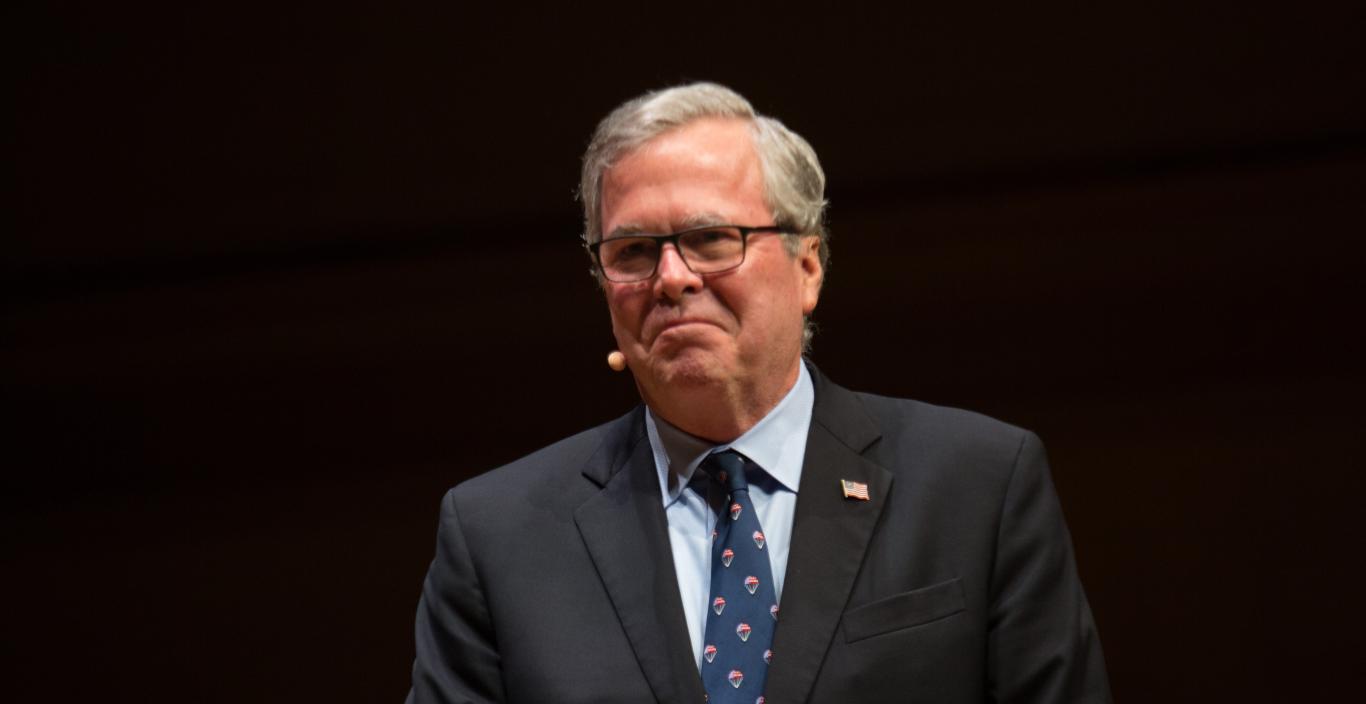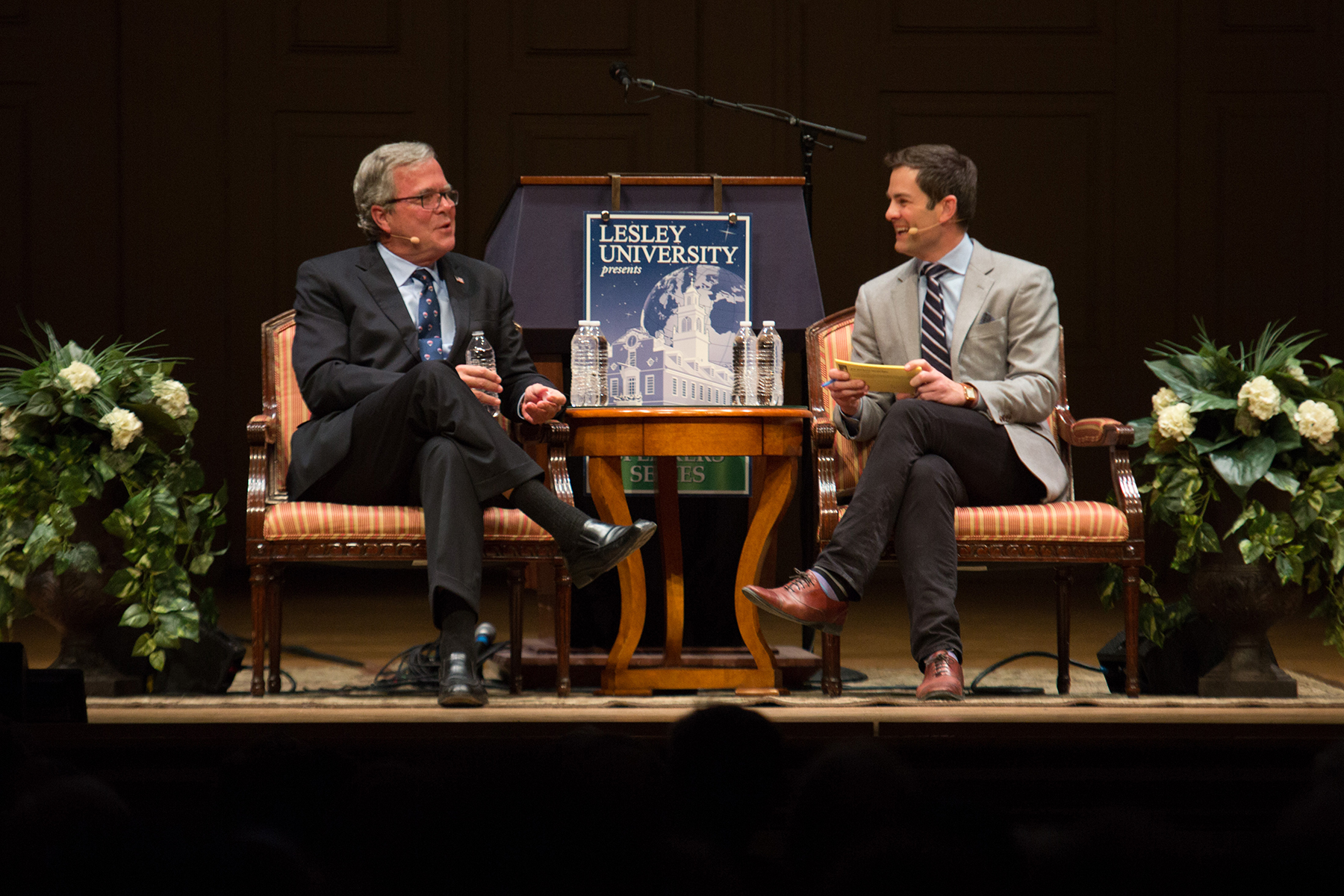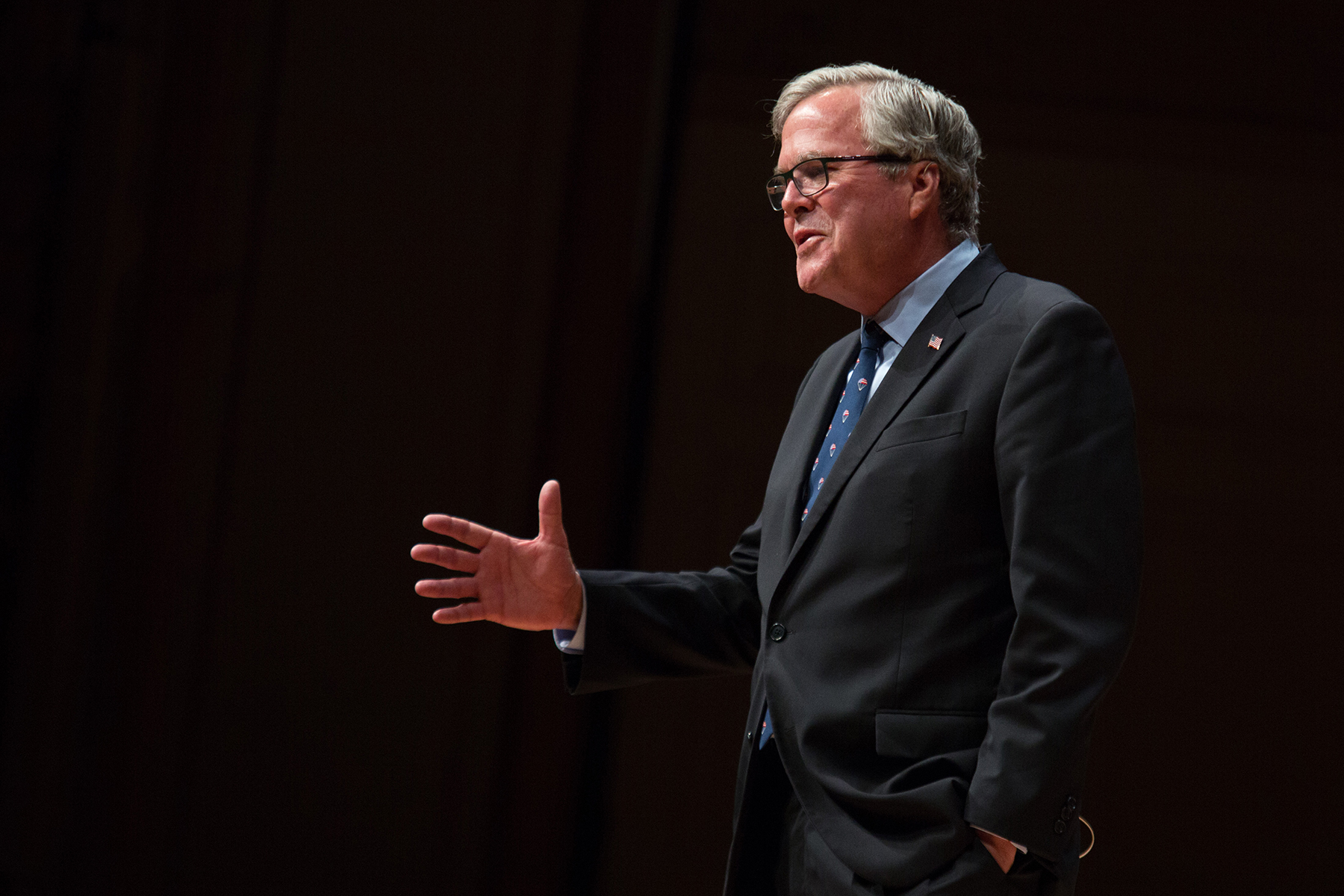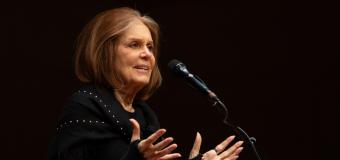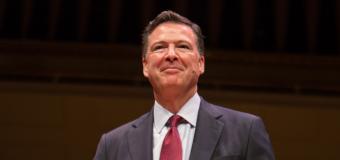Jeb Bush talked about his family, shared suggestions for emerging from our nation’s “funk” and encouraged decency and integrity during his lecture at Lesley University’s Boston Speakers Series at Symphony Hall on Wednesday night.
Bush, the son of President George H.W. Bush and First Lady Barbara Bush, and younger brother of President George W. Bush, covered topics ranging from immigration, our toxic political environment and his belief in education reform to the power of “BHAGs” – his acronym for “big, hairy, audacious goals.”
The self-described conservative Republican warmed up the liberal-leaning Boston audience by joking that, “I’ve been told this audience is mixed politically, maybe slightly tilted one way than the other. To me it doesn’t matter a bit, but it dawned on me, this may be the very first time you’ve actually paid to hear a Bush talk,” he said as the crowd erupted in laughter and applause. “I don’t think you’ll break out in a rash or have some kind of infectious disease as a result of it, God willing. But it is a joy to be here.”
WGBH Executive Arts Editor Jared Bowen welcomed Bush to the stage, noting during his introduction that Bush was a onetime classmate of Patriots coach Bill Belichick at Phillips Academy in Andover. Asked later who will win the Super Bowl next Sunday, Bush replied that “the talent that New England has, mined by the greatest coach, leads me to believe that they’ll win” – a prediction the audience welcomed with robust applause.
See more photos from the event.
At the outset of the lecture, Bush recalled his parents, who both died last year.
"I miss my mom and dad a lot. They are my inspiration in so many ways,” said Bush. “All the mistakes I’ve made in my life – and there’s a long list we won’t go into tonight – are my own doing. It is a blessing to be their son and it’s great to see people realize that decency, integrity, courage and being kind to one another are actually virtues that are timeless.”
He noted that changes are happening more rapidly than in his parents’ era, including the incredible advancements in technology, artificial intelligence, medicine and big data analytics, all while the “American safety net” of strong families, vibrant civic institutions and strong faith institutions has diminished.
“On top of that, we have a political system now that is just broken. This is a really dangerous time. We’re in a heap of trouble,” said Bush, who was Florida’s first ever two-term Republican governor, serving from 1999 to 2007. “We’re at a time in our country where we need to figure out how we can unite around a set of common objectives, embrace the set of shared identity that is really the essence of who we are as Americans, and get on with it, because we’re living in extraordinary times.”
Advice for America
Bush boiled his advice down to four points: Focus on the things that we have in common to rebuild a sense of shared identity; go back to being a “bottom up” country; solve problems in our families and within our communities; and repair our toxic political environment.
“If you’re a liberal, I’m sorry, but you’re going to have to start reading the editorial pages of the Wall Street Journal,” said Bush. “And if you’re a conservative, you’ve got to eat your broccoli and force yourself to read the editorial pages of the New York Times.”
Leave your comfort zones, he urged.
“What you’ll find is, if you thought it through, your views will be challenged and validated,” he said, “but more importantly, you’ll also recognize that people who have different views aren’t the enemy. We have to get back to the point where, as Americans, we are diverse, we have different points of view, it’s ok. But don’t ascribe bad motives to people if they don’t agree with you.”
Bush illustrated the “bottom up” approach with the example of one of his so-called BHAGs. He described Florida’s major gains in education and literacy during his governorship, successes that were bolstered by an ambitious mentorship program for struggling third-grade readers that was embraced by a wide swath of government agencies, organizations and community volunteers.
“You can believe in bigger government or less government; that’s not my thesis here to talk about. But without the big and caring hearts of our communities, we’re not going to solve problems,” he said, “and the social strains that exist today are going to become even bigger.”
Bush criticized the nation for educational inequity, called on every state to teach “robust and rigorous” civics education, and hailed the benefits of school choice.
“School choice isn’t the be-all end-all, but it becomes the catalyst for all sorts of other reforms,” said Bush.
He stated that 60 percent of first-year community college students need to retake high school English and math.
“Who is fooling whom?” he posed. “The complacency of our country is pretty amazing when you think about this, because the net result is that the cost is enormous, kids drop out and they don’t have the skills to be able to take advantage of what comes their way.
“Education is the first priority. It is the path out of poverty. It is the path to be able to ride the technological wave rather than be drowned by it,” said Bush, who is founder, president and chairman of the Foundation for Excellence in Education, a nonprofit organization focused on state education reform.
Campaigning in modern America
“Our politics is really toxic right now. I’ve got some personal experience. I don’t know if you can see the tire mark on my forehead,” he quipped.
The 2016 presidential hopeful recalled the positive experiences of campaigning, like the many people he spoke with throughout town hall meetings in New Hampshire. He also recalled how then-candidate Donald Trump berated him.
“I was the guy who couldn’t take the stuff,” he said. “So I called him out all the time, so I was his target. And you know the president doesn’t like people to call him out, so he was drilling me a new one each and every day.”
One day, Bush learned that Trump called him a vulgar term – “I can’t repeat it but it starts with ‘a’ and it ends with ‘hole,’” Bush recalled. A CNN reporter pressed Bush for a reaction to the comment, but he didn’t offer one.
“The only way I would have made news that day – and I had four town hall meetings that day, I’m spilling my guts, I’m hugging people and I’m crying, I’m sharing my views about how to fix things – and the only way I’m making news that is to call him what he called me. That’s the environment we’re in today, and it’s ratings driven,” said Bush. “… Meanwhile, we have these huge challenges and opportunities, and we’re worried about whether someone calls someone an a-hole. That’s the toxic political environment, and it’s getting worse every day.”
Asked later about Trump’s presidency, Bush spoke positively about his deregulation efforts and judicial appointments, but condemned his divisive rhetoric.
Civility is not a sign of weakness
As a member of one of only three families to have two relatives ascend to the White House (the Bushes, the Roosevelts and the Adams), Bush reflected on political life, particularly in today’s climate.
“One of the things about politics, it’s always better to be ‘misunderestimated’ – my brother proved that,” he quipped.
“I get a big kick out of this. He won two elections and he was always ‘the stupid guy,’” said Bush. “He ran against two Harvard guys – he actually went to Harvard, too – and beat ’em. And the reason he won is he was really smart and he came across as a normal human being and he was likable. … That’s a great lesson in politics, to show your heart for people and be normal and be down to earth.
“Hollywood loves to create this image of (my brother) as a guy who somehow couldn’t read a book, and he’s got self-effacing humor that kind of validates it in minds of people who don’t follow this stuff.”
Bush assured the audience he will not watch the new movie, “Vice,” about his brother’s former Vice President Dick Cheney – “I’m not going to pay to see my brother get disparaged,” he quipped. “I wouldn’t even watch it on Netflix, to be honest with you.”
And as he concluded his lecture, Bush said that if his father were here today, he would tell us not to mourn the loss of the Greatest Generation, but to help build the next Greatest Generation.
“As a parent and a grandparent, I feel duty-bound to do that and I bet you do as well,” said Bush. “Part of this relates to a little bit more civility. It’s not a sign of weakness to actually care about each other.”
He then read the letter that his father left in the Oval Office for his successor, President Bill Clinton, which ended as follows:
“There will be very tough times, maybe even made even more difficult by criticism you may not think is fair. I’m not very good at giving advice, but just don’t let the critics discourage you or push you off your course. You will be our president when you read this note. I wish you well. I wish your family well. Your success now is our country’s success. I’m rooting hard for you,” wrote George H. W. Bush.
“My dad is an inspiration to me personally,” Bush reflected, “but that idea today I think is more important than ever before.”
